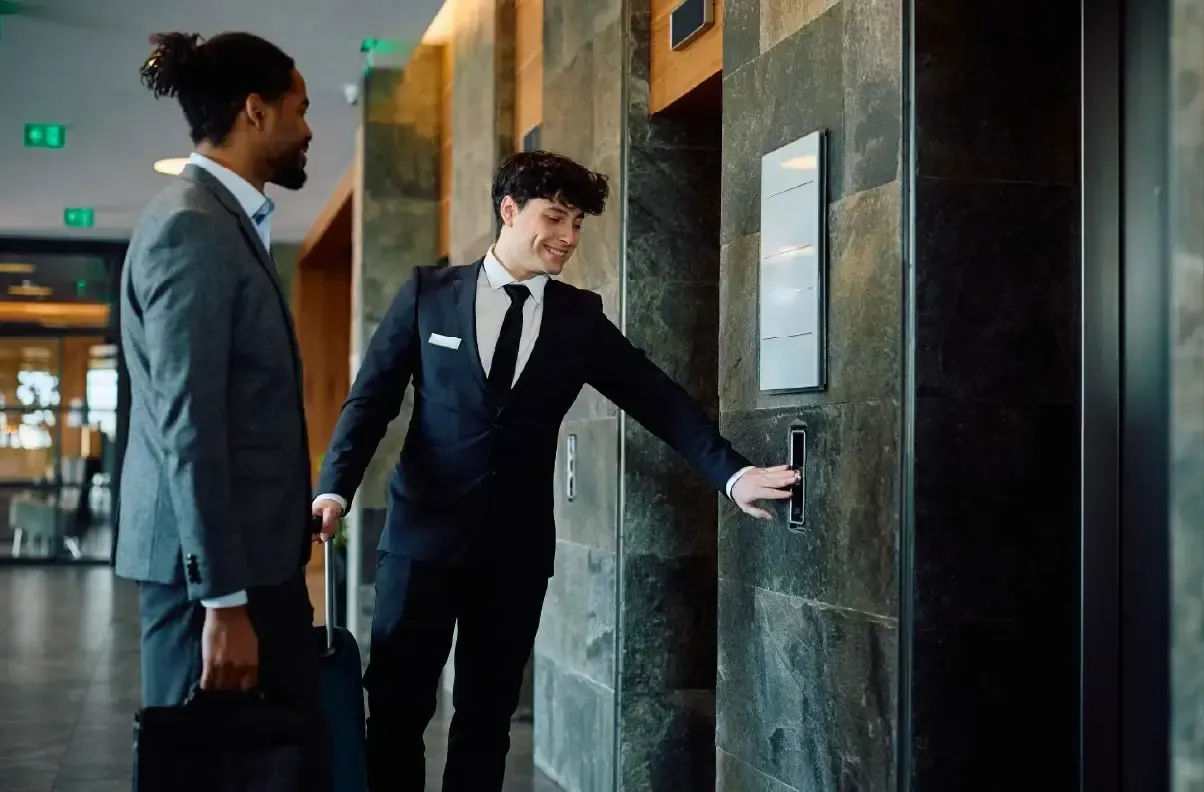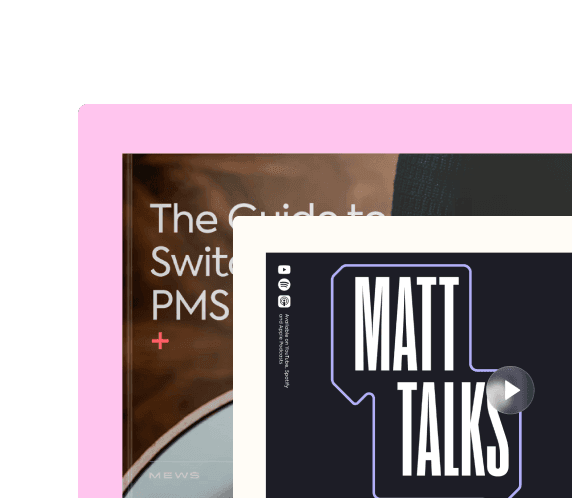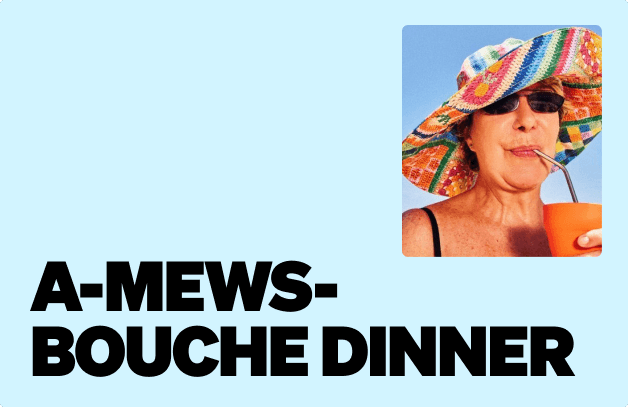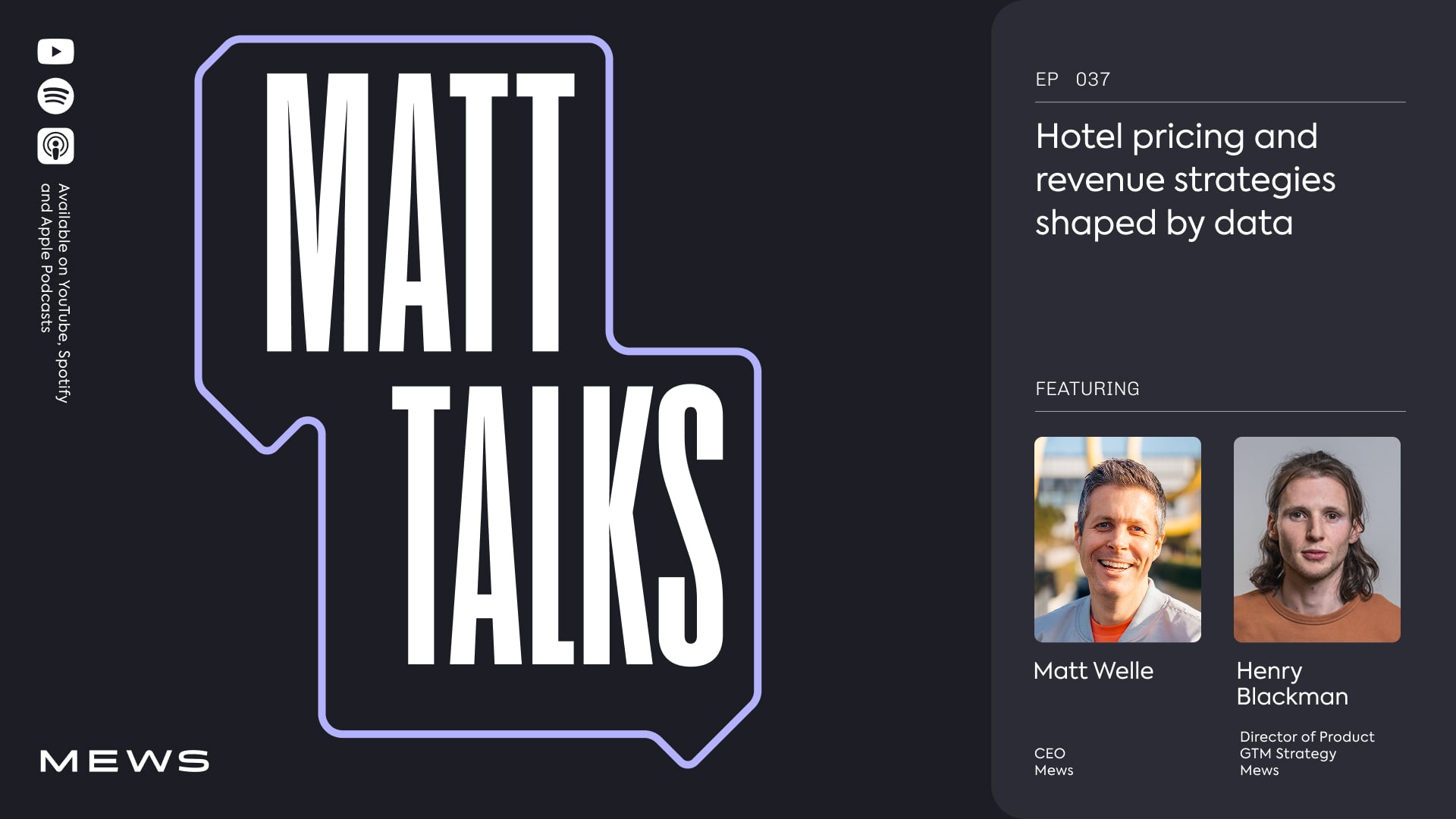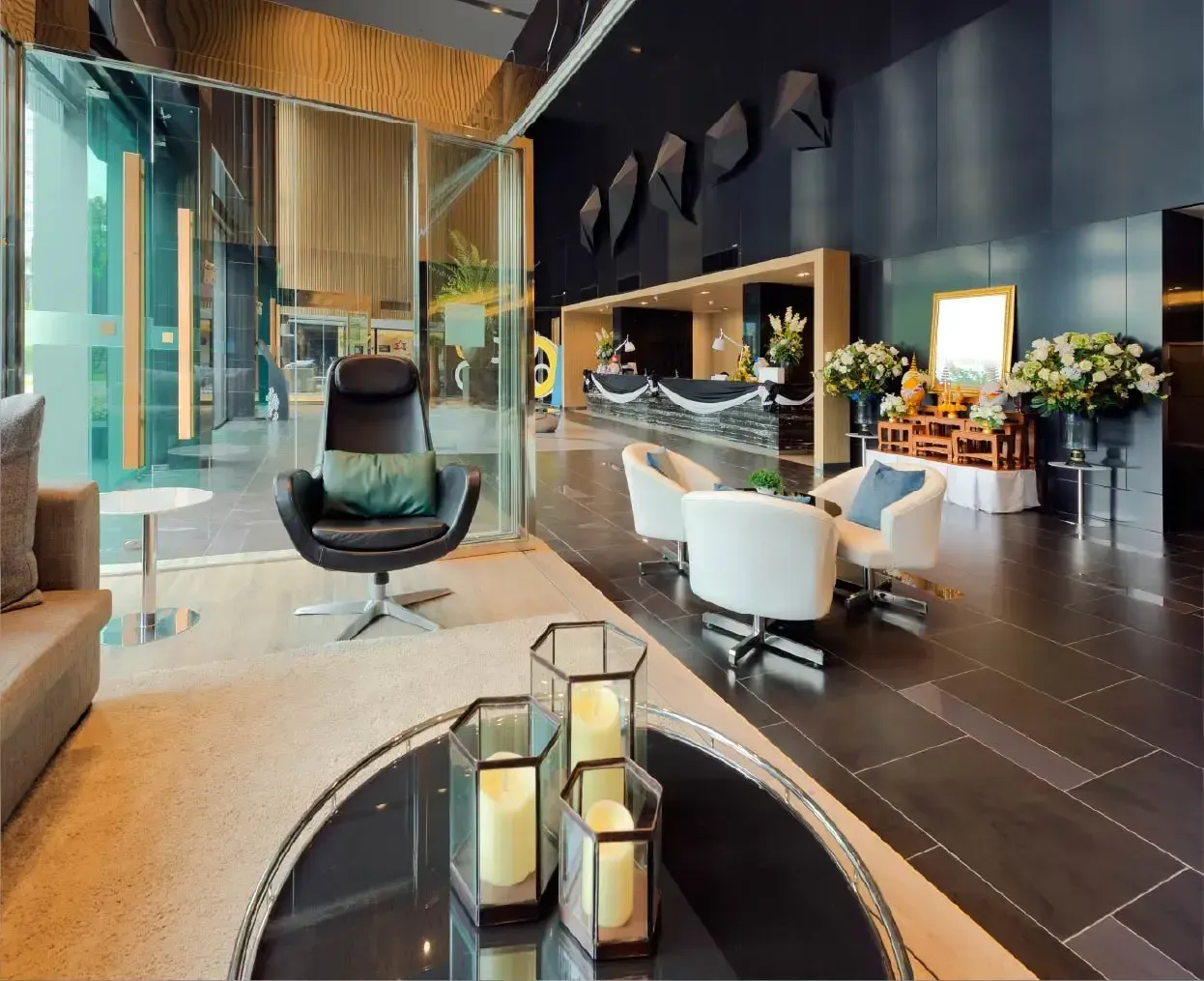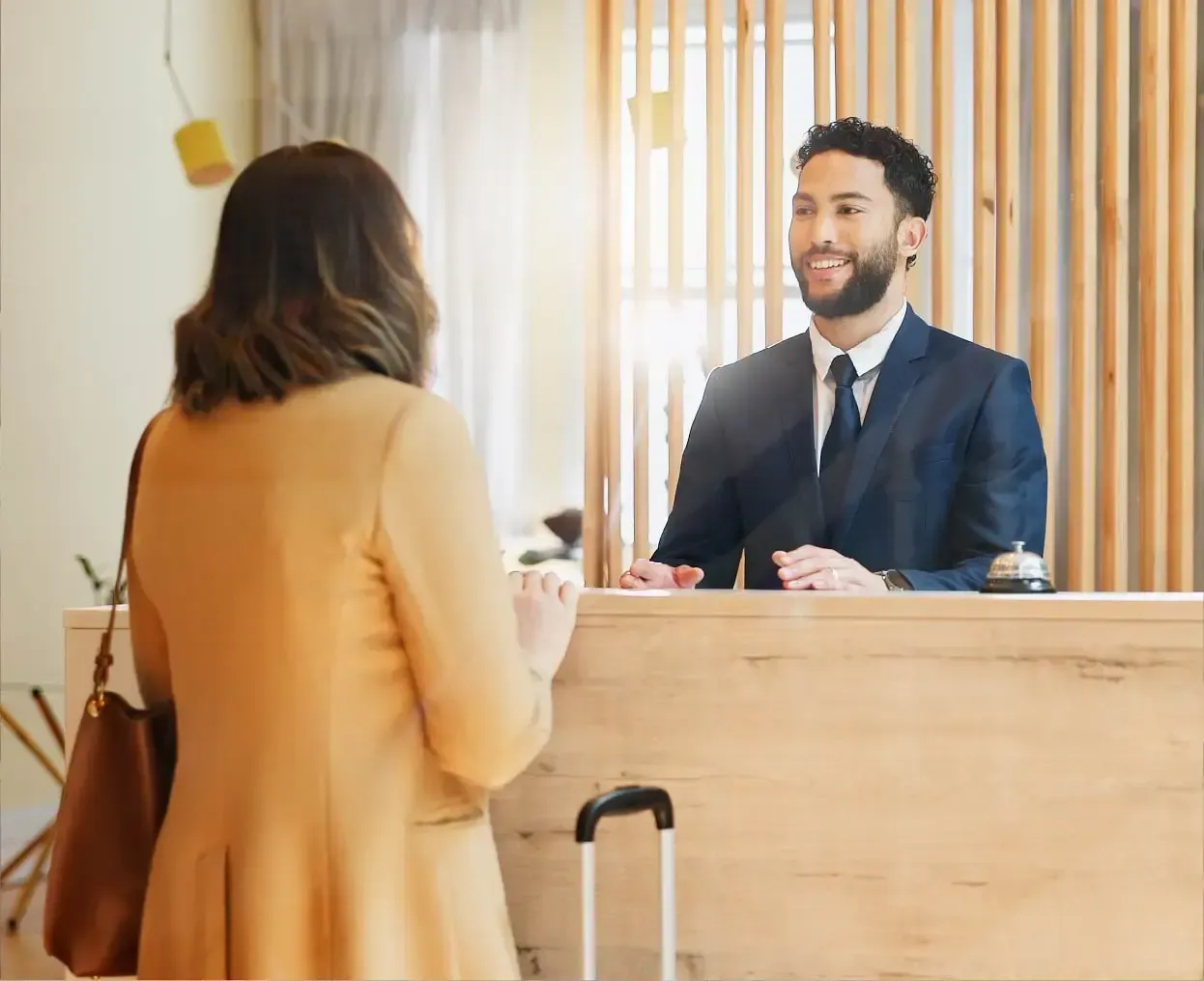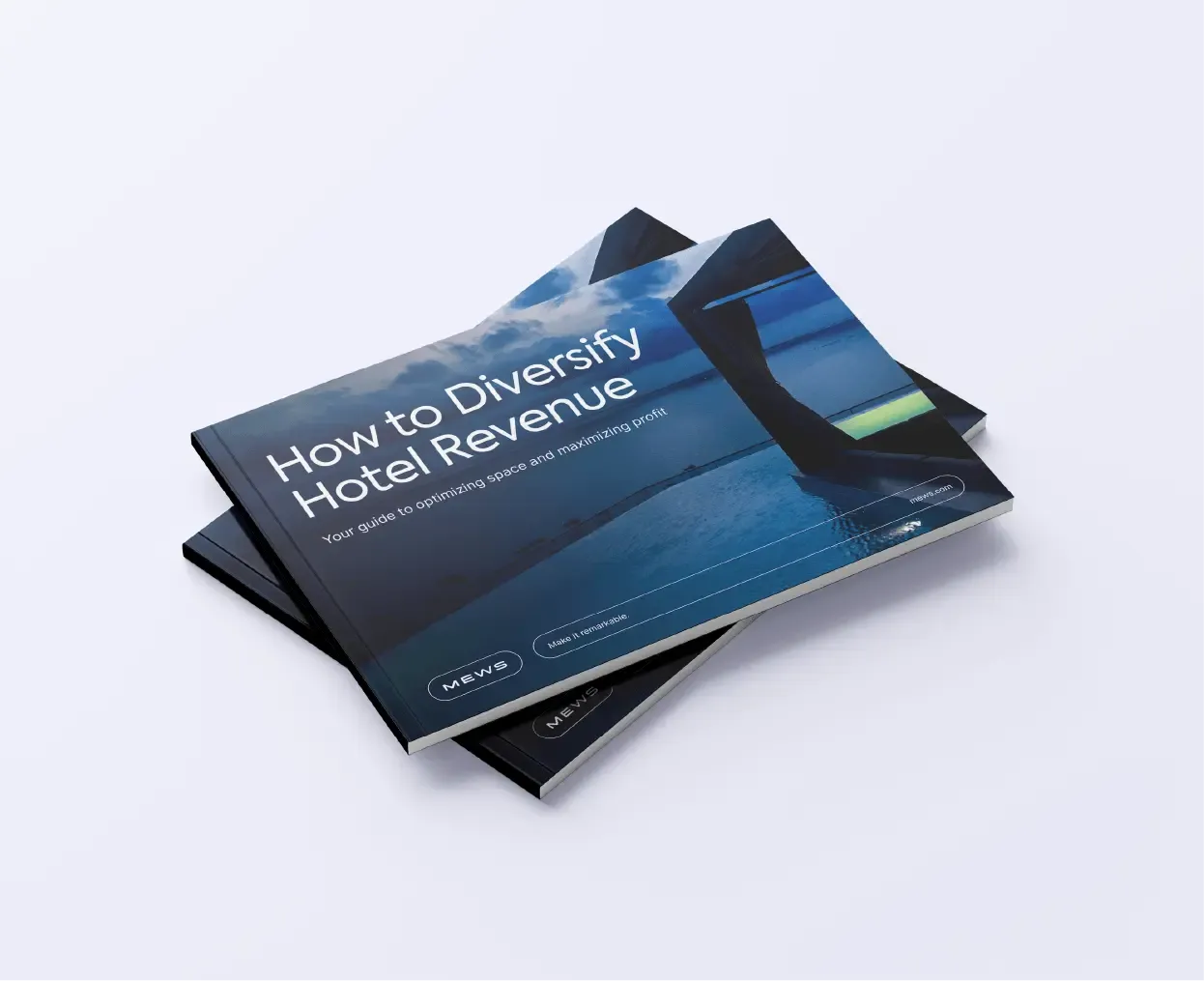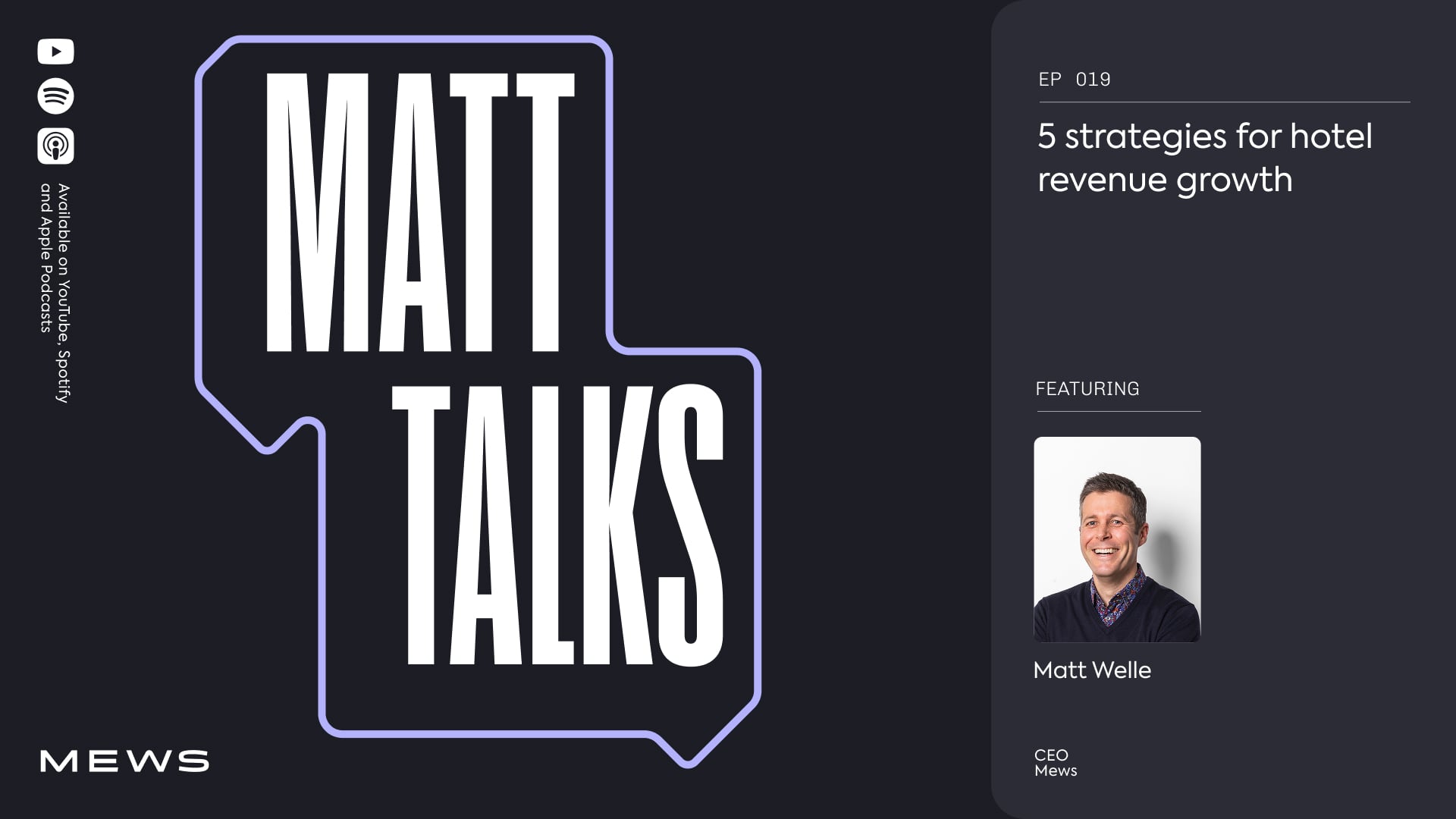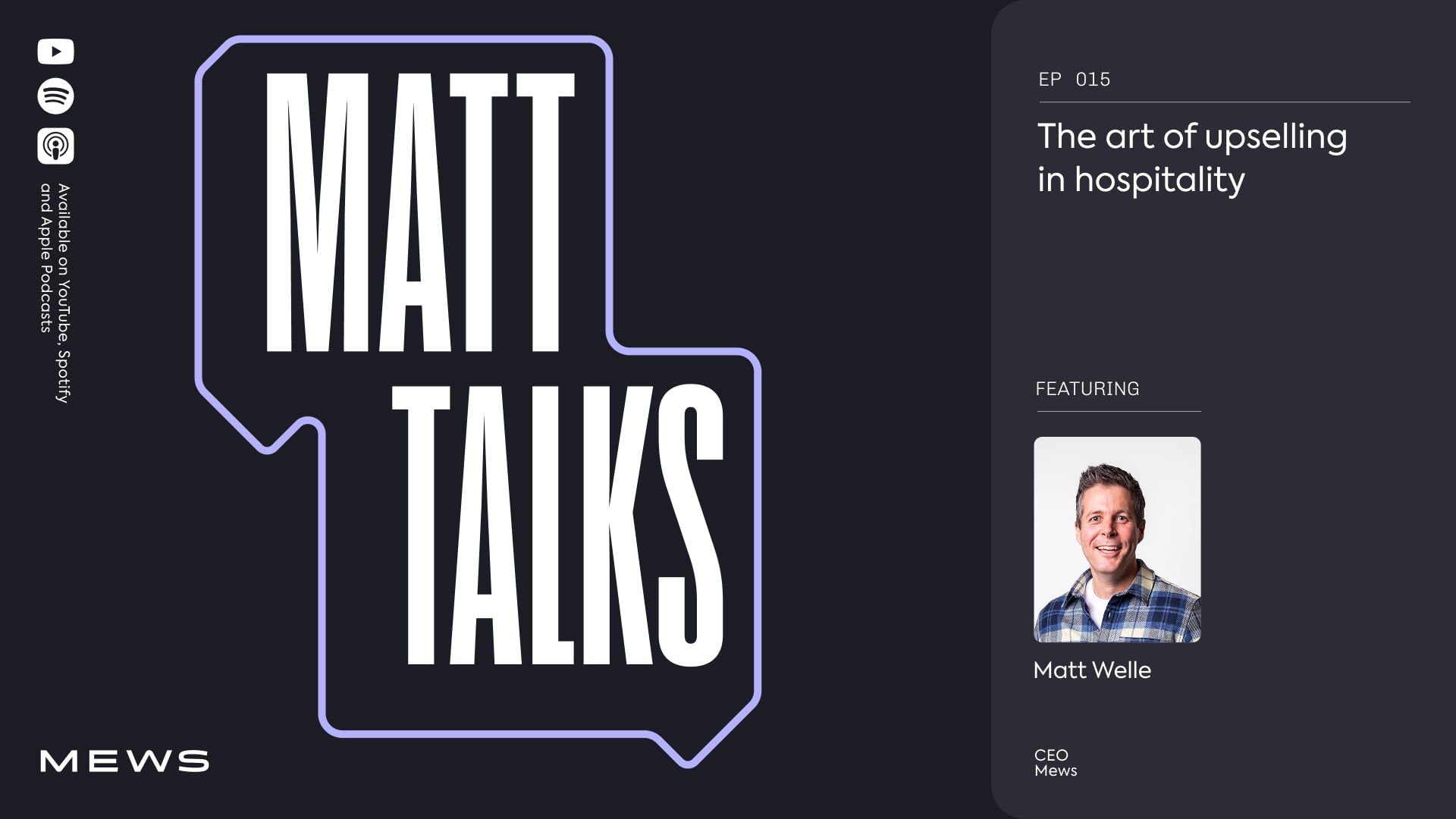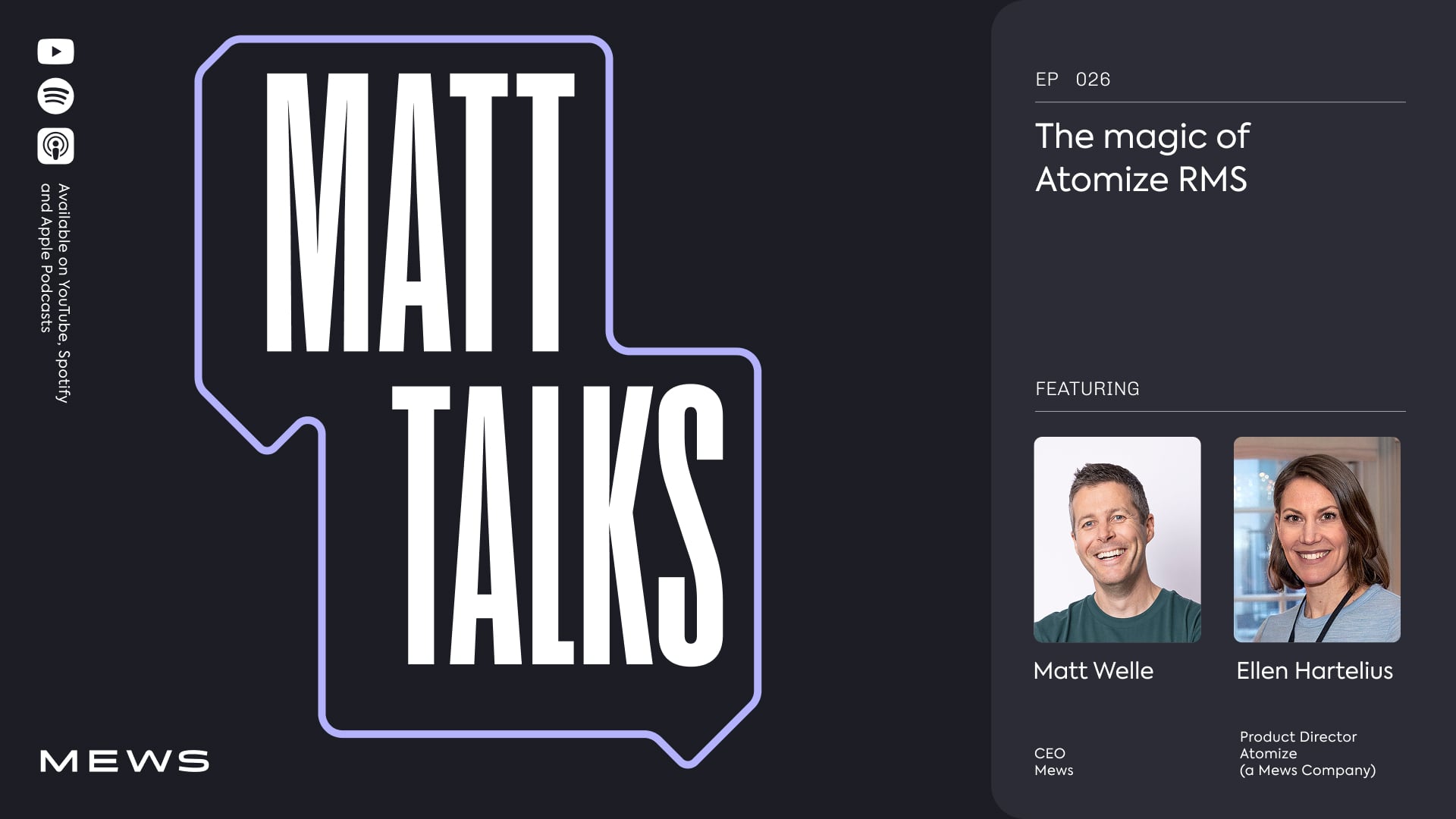What to expect?
Meet your speakers

Matthijs Welle
CEO, Mews
After years in the trenches of hospitality, Matt joined the Mews journey during its early days in 2013. Since then, he’s been our fearless CEO, leading the company and the industry forward.

Henry Blackman
Director of Product GTM Strategy, Mews
An experienced consultant and strategist, Henry brings a data-first mindset to revenue strrategy and knows how to make hotel pricing better.
Episode chapters
Transcript
Introduction
Hi, everyone. Welcome back to another Matt Talk. This week, I want to talk about revenue strategy specifically, and I thought, who in Mews is the right person to talk about revenue and pricing, who thinks all day every day about these particular topics? And Henry Blackman has joined us a couple years ago, I think, already in a pricing role, but he's recently been promoted to Director of Product GTM Strategy. Do you wanna briefly introduce who you are and, like, kinda what's your background? Why do you get a voice on pricing strategies?
Yeah. Of course. Well, first of all, thank you so much for having me on Matt Talks. I think one of the interesting things about how I've ended up here is that you and I came from very different roots, you know, into this room. I came from a world of business and consulting and really cut my teeth working with businesses across a range of different industries, helping them ask themselves the right questions that lead them to an optimal outcome or an optimal deployment of their resources in order to generate both the customer outcomes that they're after, but also support a healthy and growing business.
I think when we met you, we're like actually, Henry is really, really smart, and I think it makes sense for him to move from consultancy to actually long-term solving a problem. Because a consultant will often come in, they give an advice, and they're off to the next problem, whilst you're left with figuring out how to operationalize it. Whereas with Mews, you've been around for a couple of years now. So a lot of the pricing and packaging that we do with our product, you've actually had to implement and make sure that it's a success and then look at the results and then go back. In that time, do you often reflect back saying, okay. I didn't get that right, or most of the time you got it right?
I mean, of course, there's always, you know, learnings that need to take away from any of these strategic changes that people make, whether it's in, you know, a business enterprise in our world or whether it is a customer-facing role. Those situations require a feedback loop. You need to be able to have sort of objective reflection as to the decisions that you've taken and work out what it is that has moved the needle and what it is that actually didn't quite make the mark. For years, I've worked with executives and business leaders that are desperate to get their hands on data and insights to steer their decisions.
Chapter
How hotels should approach their data
But often, they're waiting for those insights to arrive before they think about what they can do about it. And in truth, a lot of my job is to simplify the complex. And the numbers only ever really do one of three things. They go up, they go down, and they stay the same.
And we don't have to wait until we get that detail to start to envisage what we might do as a result. And for me, I've really tried to, as I say, simplify this. And the rule that I tend to give is that when you see positive indicators, go and do more of it. Find ways in order to deploy more of your resources in that area.
Find ways to grow that part of your business disproportionately quickly from the rest.
So when you look at hotels specifically, but I think this also applies to your role, we're not great at reporting in hotels. We're not great at trusting the data. What do you do if you're like, I'm not sure if the data is correct. How do you then, like, make decisions?
Because we have to make decisions. Right? The worst thing you can do is not make a decision or not move forward. But how do you deal with, like, data that just isn't clean?
Yeah. Well, we have to really recognize that data more than anything is like a proxy measure for a behavior. And, realistically, every business environment is working with people. And people are imperfect. They make decisions sometimes in irrational ways. And, fundamentally, they're based off of a filter of perception rather than the true reality of every situation. And when it comes to data that you may not necessarily trust or have complete reliability in, you're ultimately trying to just hone in on what is it explaining about an underlying behavior. And so looking at multiple sources to stress test against each other, to build hypothesis tests that you can then go and really extract whether it's indicating what you think.
Can you give an example of a hypothesis test that a hotel could run to just validate something?
Yeah. Of course. For example, we see, you know, across our customers, some of those that are being really, really successful in optimizing their check-in and booking flow. And some of the ways in which they're doing this is they're looking at the customers and the guests that they have arriving and not what it is that they can sell to them, but what it is that that guest is trying to get out of their stay.
Are you a destination hotel? Are you an experience? Are you just a bed and breakfast? Have you got people coming through?
There's lots of different options. And what they're doing is they're recognizing where they want to see additional value beyond just the bed for the night. And they are embedding these things into their booking engine and into their booking flow. Now when it comes to a proper test, what we're really pushing them towards is identifying a small number of things that they can easily offer.
They can attach into their booking flow, and they can measure what the uptick in attachment is, what the uptick in revenue contribution is. And in fact, these sorts of things, they disproportionately flow to the bottom line. So what is the impact that they have on your profitability, as well as better serving the guest and giving them nicer experiences, you know, as they come through your property?
Chapter
Revenue and upselling best practices
Yeah. I think one of the challenges that I always have with hotels who are, like, just trying to make more revenue, like, that's the goal. Like, they just want to make more revenue. So, like, great.
I'll just add some random upsell products to the flow, and then no one buys them, and they think upselling doesn't work. And it's I don't think that they've done the work to actually talk to customers or to deeply put themselves in the shoes of the customers and thinking, what would I want? If I was a business traveler coming to this location, why would I want to buy something from that flow? But it's so important to understand, like, what they're looking to buy or what they might be enticed to buy because you understand the motivations of the customer.
Completely. Completely. And this has been, you know, one of the big philosophies I've been projecting within Mews over the last few years. Kind of a level one, kind of standard of thinking around this is kind of like just basic room rate optimization, but that speaks to competing in part of the service offering that is the most commoditized.
It lacks the nuance to really understand the things that separate the popular and the profitable hotels versus those that are just getting people coming through the door. Now there are tools to support this, like this wave of advanced RMS functionality that's delivering data straight into the decisions that are being made. But there are more advanced ways to start thinking about this beyond just the rooms. The kind of the level two thinking, from my perspective, is then looking to monetize the rest of the resources that you have within your space or your property, right? And you saw Mews be a reasonably early mover in this a number of years ago as we worked with Mews spaces, now global services, around how can you monetize parking and bicycles and flexible spaces in order to increase this guest offering. Sure. That's a great development as well.
Chapter
Empathy as part of your revenue strategy
But the really advanced places that are leading the industry are those that acknowledge that revenue is the goal, but it's not the starting place. The starting place is actually a deep empathetic understanding with your guests and what it is that they are really here to get out of their stay.
How do you get that? How do you find that information?
Well, ultimately, you're not gonna do it by sitting in a room with your management team talking amongst yourselves. And, actually, I would perhaps challenge, like, some of your listeners. What are the most recent pieces of research? What are the direct pieces of feedback that you get from your guests in order to shape and steer how you're evolving your offering?
And I think you can use ChatGPT to find hotels because it scrapes customer reviews. But you can actually query it by saying, well, what are my customers talking about? Like, what are clearly, the facilities that they seem to care about because they're talking about it online positively or negatively. And then that is a lot of good feedback that you can use to build out a portfolio of products to do an upsell.
Naturally, there's gonna be tons of sources online, and some people are gonna be vocal. You're not always gonna be certain that those views are representative of your customer base, but you might have some strong voices in there, and those flags are gonna be useful. Those might indicate things that I would be interested in deep diving, but not necessarily taking as gospel. For me, I don't think research has to be laborious, intensive, or expensive.
I think it even starts with encouraging your guest-facing team to utilize the automations and the tools that these software systems are offering so that they can lift their chin above the screen. They can engage more closely with the guest, and they can have more open conversations about what it is that you're trying to get out of your stay here so that the check-in process is more about facilitating the hospitality than it is about facilitating the admin. And if you create a way of engaging with your guests for a month and then have a discussion with your team, you will be infinitely more empathetic to the things that the mass of your guests are saying.
And I think I think interviewing even your frontline staff, like, at the reception, like, just doing qualitative interviews and, like, you know, what are the topics that guests are engaging with you on, and just learning from them, but also interviewing guests. Like, it feels like a really awkward thing to interview customers. But, actually, they will appreciate you taking the time to actually learn from them what works, especially your regular customers.
They come regularly for some reason. Have an interview. Like, invite them for coffee and figure out the underlying kind of the quote. If like, what's the thing that makes them tick?
What would they love to see more of? And I don't think we do enough of that in hospitality.
Yeah. Yeah. I mean, I see you know, obviously, you know, both of us travel a lot for work at the minute, and so we get the opportunity to stay in lots of hotels. I see you speak about your personal experience.
And I don't know how you feel about whether some properties and some hotel organizations, they really understand that a lot of your perception of value is gonna be set within those first ten minutes in which you walk through.
And are they making that ten minute period of your life, a ten minute period of your stay about them and about you meeting the needs of their administrative processes, or are they making it about you and kicking off your stay as you've just come off of, you know, a plane or out of a taxi in a way that makes you excited and positive about the fact that you've arrived and all that you're gonna get access to?
I agree. That first and last impression is the thing that matters the most, and it is so homogenized. So, like, it's always the look for the reception desk, then queue up, then get ignored, then get your plastic key, and then point it to the elevator. And I was like, these are such great moments to, one, sell the hotel and make sure that they actually use the facilities.
Like, if you don't talk about the restaurant with passion, they're not likely to go to the restaurant. They'll probably leave the hotel. But the first night of staying in a new hotel, you don't know the city. That's the perfect night to upsell a reservation at the restaurant.
But it's just, like, making sure that your teams are comfortable engaging on those topics, and most hotel team members are not.
Well and it's a great opportunity for the hotel staff to become almost stay consultants, experienced consultants that can help curate the elements that they have directly within the property, but also, you know, in the immediate locality and point them in the right direction. Yeah. I think it's, you know, it's an evolution from there being one concierge with a desk in the corner of the lobby to the fact that, actually, every interaction can be, you know, as a service that has those elements of concierge guidance.
Like, we've put our team members through training about, like, how do you have a qualifying conversation with a customer? Like, what are the right questions to ask and what are the wrong questions to ask? And then once you've captured the data, they go into our system and upload it into the system. And it's the same with what happens in a hotel.
You have a conversation with the customer, you capture what they're saying, put it into the guest profile so that our AI tool tips can pick this up. So that next time they engage with the reception, your colleagues now know this customer cares about restaurants or Mike, our President, deeply cares about filter coffee, I've just learned. Yeah. And I was like, that's a great note to have because what you could do is you could do some research. And next time he comes to the receptionist, you can say, I know you care about filter coffee.
I actually did some research. Here are three places. He is going to be so loyal to you as a brand. But because we haven't taught our team members to have open conversations and lock that data back into the system, we don't have these revenue opportunities.
Completely. And I think to that example, it speaks to the importance of recognizing perception and that perceived value varies based on time, based on moment and, like, emotional context.
The actual value of a filter coffee is really, really low, but the perceived value of proactively offering hospitality rather than reactively, at a time in which somebody probably really wants a cup of coffee, that suddenly multiplies its value as a service by a factor of ten. We're more likely to bring that person back in. I think we see the best examples of customers, you know, across our network, which is tens of thousands now or above ten thousand. We see that those that compete on rooms and rates are commoditizing their offering.
Chapter
Shifting focus from rooms to experiences
But, actually, we see this shift between going out of rooms and spaces and towards services and experiences. And there's this fantastic example, I don't know if, how familiar I was, Puro in Poland. Puro will have this wonderful case where if you look at it, they speak about the types of guests that they have. They ask, are you coming for work?
Are you here for leisure and enjoyment? Are you, you know, just stopping through? And from that, they are then positioning bundled, curated experiences that speak to those specific needs. And they're so confident in the fact that this works, that this has higher grandeur in their marketing and in their booking flow than their positioning of rooms.
You know, you want information about rooms and rates and booking? It's down there at the bottom. We're here to sell you an experience, and here is everything that we have built in order to give you that. That's so good. It's a chef's kiss.
Wonderful.
So if you think about traditional, we have a role in hotels called revenue manager. And the focus of the role of the revenue manager is to drive room revenue. Right? So optimize room revenue so that every year, you see the room revenue growing.
I think that we're shifting as an industry towards total revenue management. So I actually think that that role shifts towards revenue strategists. So they're not just looking after Excel sheets trying to make the rates iteratively better every single year. They're thinking much more holistically.
If you think about a hotel hiring for that person or shifting the job description towards it, what are some of the key skills that a strategist needs to have versus a traditional revenue manager?
More than anything, good data skills is gonna become an increasingly important part of all of these roles. But utilizing the tools rather than trying to conduct those things manually is gonna separate revenue managers that, you know, learn how to do their job, you know, kind of in the nineties and the noughties to those that are really willing to adopt the modern tools and use it to multiply the value that they have to their owner and general manager by a factor of five. Yeah. And that's where we're seeing this shift.
Now I think about, like, the core sources of information that a revenue manager needs to be comfortable with in getting their head around. And more often than not, we've seen that it has historically been very inward-looking. It's just about what happens inside my booking engine and the four walls of my property. And, actually, there is important information that comes from the market context within which you are selling.
So if you empathize with the customer and the guest, who are they seeing as their choices and their options? There's then information about the guest themselves. It's detailed guest profiles. It's how are you collecting information about what they've been doing in the past.
There's aspects about spend patterns, and I think a recognition that not all revenue is the same. Different categories of revenue have different value to you as a business, and those need to be considered in the opportunity.
But I think that's, you'd hit a point there, where I'm like, whilst you were starting in charge of pricing, you would always come with a case study that also showed the profitability of specific items.
Like, you know, what's underlying is, is this a revenue item that comes with a high profitability versus one where, actually, it's almost like for like, where it's a pass through. And you wanna sell like, you know, if you think about a hotel, breakfast is not a very like, it might drive nice revenue, but it's not very profitable. You gotta have the giant buffet. You have to have lots of staff to serve it.
An upsell to a larger room is a much more profitable item that you could sell because that room exists. And if it's gonna be empty, you're not gonna make money out of it. So an upsell of a room type is much more profitable. An upsell of a coworking space is much more profitable than focusing all of your attention on, for example, breakfast.
Yeah. Completely. I mean, in short, we're looking for things that help grow revenue, grow the share of customer spend on their total stay. But we really like opportunities where we can find this, where it does absolutely nothing to our cost base.
Yeah.
So revenue strategists will go beyond sitting in their office looking at data. They actually have an opinion about the data, and they're also in charge of rolling it out. So making sure that the departments they need to influence the departments saying, right, we're gonna run a test. For example, early arrival upsells, right? But you can't just put it in the system and then walk away and then after two months complain that it doesn't work. You've got to now engage housekeeping to make sure that they turn rooms back to operation on time so that the front desk or the kiosk can sell those products. And I think the role of a revenue manager isn't just sitting in a room with an Excel sheet to influence across the different departments.
They have to work. They have to get those people on board and saying, this is a highly profitable item. I wanna do a test. And the testing is one of those big things that we do at Mews often where we just wanna run a test for a couple months, and if it works, then great.
But if it doesn't work, that's okay as well. We've learned a lesson. Let's move on from it. Like, what's the advice you would give to hoteliers?
Where would they where should they start with testing?
I mean, as I said, I think that it really is situational.
It depends on your hotel, your guest type, and you need to go and evaluate those basics around what are the things that makes me similar to my neighbors, and what are the things that makes me different? And within your guest types, what are the common traits that these clusters of guests have that make them similar? And what is it that makes them different from each other?
And where would you do that? Would you do that, like, on a whiteboard? You just sit in a room and actually map out all of these different customer types, or what's the way that you would approach that challenge?
Yeah. I think, you know, working with a small group of your colleagues is a good place to start. You need to not be paralyzed by having a hundred percent certainty and perfection. You know, you need to get to a level of confidence that allows you to move forward.
You will find opportunities where, here is a value gap where the guest isn't looking for something that we are not currently providing. And if we find ways to develop something to fill that gap, then the revenue becomes a very easy problem to solve. But just starting with looking for more revenue is difficult. Yeah.
Chapter
Steps to effective monetization strategy
There's a model in monetization strategy that I really like, and there's four steps to it that I think hoteliers can really learn from. So the first is you just need to be able to create services that your guest segments value and it's understanding that value gap and how you can populate it. The second part is then working out what are the right moments in time to pitch a position and promote these. Is it the booking or the pre-check-in?
Is it mid-stay? Is it check-out? The third is that you then need to package these services in ways that really empathize with their frame of mind, and this goes to the example around filter coffee. And you wanna be able to communicate that price is really aligned to value.
You want those two curves to broadly map each other. And then finally, the final step is you wanna ensure that you actually capture this by the execution process. And this is relying on your tools and systems and in our world, our deeply embedded payments to minimize the friction and the pain of payments and ensure that that transaction is captured seamlessly. And if you do go through these four steps, what you will find is that you are making up a value gap based on the customer's perception, and you are positioning it to capture that revenue as effectively and consistently as possible.
Love that. Matt, when you think about our revenue strategy as Mews and an organization, how do you how have you found the balance between looking at a small number of very big bets, simplifying the complexity and trying to do it well versus looking at there's a whole wealth of options we could do, and let's scatter gun and piecemeal across the base. Like, how do you work out? What is the right number of things and the right level of complexity to to go after?
It's really hard, and we hire smart people like you to tell me what the answer to that is. But, ultimately, if you go to a restaurant and the rest like a Cheesecake Factory. Right? You get a menu with eighty pages with like, filled with items, and it frustrates me.
And I end up not wanting to eat there because I'm, like, I am overwhelmed by the choice. Whereas if I go to a restaurant and you get five starters and five main courses and, you know, it makes it easy because I now have a choice that I can kinda comprehend. And I think people are not looking for huge variety even though they think they want that. People think that they want lots of choice.
But when you give too much choice, you distract them, and they end up going with your competitor because it was just an easier process. And simplification is really critical, and this is how we think about Mews, like, and how we're embedding solutions inside each other. So revenue management should be a native feature of the PMS. We just believe that that's the system where people live all day.
They shouldn't have to log in to multiple platforms. And that's why we're thinking, let's embed it. That simplifies the offering significantly.
Chapter
Why simple is always better
Let's drive automation so that we don't have to teach people how to use the system, and simplification generally has better outcomes. And it's the same with when you think about pricing and products. Don't offer twenty upsell products. Figure out the five that work really well at check-in, and maybe you can have a mid kind of stay moment, which is when they have different options.
Maybe mid-stay, it'd be selling your spa. If your CRM recognizes that the customer hasn't used your spa, that might be a moment to sell the spa, but it's probably not the moment to sell an early arrival. And you've got to really figure out the different moments of the stay and then the different products you can slot in. But don't sell more than five products because you will lose that customer.
They will buy nothing from you.
Completely. Completely. I'm with you on that. I think there is a shift in our business, our industry, but also actually lots of industries, including hospitality itself, that is this shift from a provision of service to a provision of solutions. It's not, you know, corporate jargon in saying that. It's a recognition that, actually, we are trying to get the customer and our partner to an outcome where both of our incentives are aligned.
If you win, we win together. Yeah.
Rather than here is just a service and good luck. And this, you know, comes from, as I said, you know, earlier on, an innate understanding of who your customers are and how they break down and what it is that they are trying to solve for. From our perspective, we've looked across our product portfolio in Mews, and we've looked at what are the types of properties that are really using the Mews system, how are they using it in different ways, and what are the aspects that are driving the outcomes that the business owners and the hoteliers are really looking for. And instead of then just throwing up a long menu and trying to see what it is that they think they might be interested in.
We are now saying, we have got lots of experience with customers that look just like you, and we have understood what the tools are that help them to meet their desired goals. And we have built you a bundle of products that solves these problems because of how they fit together. Yeah. From a revenue management standpoint, this has the advantage of effectively pushing attachment and adoption up to a hundred percent because you don't have to pitch them all independently.
Yeah. And in doing so, the individual price that you're trying to charge, that you're trying to push to different customers, doesn't have to be quite so rigidly controlled.
I think one of the things that I've looked at a tech website, right, the website like Mews, you go into the website and we have buying personas. So we say if you're a revenue manager, here's actually the things you probably care most about. And if you're a front desk manager, here's what you care about. Hotels don't do this.
Right? If you go to the booking.com page of any hotel, you end up getting, like, lots of photos of meeting rooms. And I'm like, someone who books meeting rooms is not gonna go to booking.com to figure out whether you've got a big ballroom. That website is purely targeted to B2C.
So make sure that your leisure facilities are really well displayed on that website. And it's the same with hotel websites. You have the ability to have different landing pages for the single business traveler who's just looking for efficiency. They wanna know if there's a gym.
They wanna know if there's a co-working space. And then you got the family with kids who are looking for the experiences. And you can do these landing pages and buying personas and modify your website. And that way, you talk the language of the customer.
And that way, you hopefully can sell more of these products. But you do have to have a strategy behind it. So identify who are the people that are coming to your hotel, how do they want to be talked to, like what are the things that they're looking to achieve with their stay, and then start talking that language at every point of the journey, which is the website, which is then having a customized booking engine for them. What you're upselling to those customers is different between the different segments.
But this is really, really hard, and it does require a person to think deeply about it and the ability to make decisions. Right? Like, this is a person that needs to sit across all of the organizations that needs to have a say in saying, we're going to try this thing out. I know it's disruptive to your department, but we're gonna do a few tests and, like, come along with it and to engage people with them.
But this is where real success will come from in hospitality, I think, going forward.
Absolutely. Absolutely. And there are psychological elements that sit alongside all of this.
Chapter
Psychological tactics in revenue management
But I think that you went there because that was gonna be my next question.
Yeah. What are some of the psychological tactics that you think that we should take?
There's two suggestions that I would like, I'd give at this stage. Number one is framing. And so this is the impact that comes to your customers and your product catalog by putting in other options that sit outside of the things that you think they might actually buy. The example I love around this is popcorn in the cinema.
If you have a cinema with two sizes of popcorn, an A and a B, you get the vast majority of people, seventy five percent of people buying the small one. If I create a third option that's just extra large, even if nobody buys it, and often nobody buys it, the fact that it exists creates a switching behavior from the small now to the medium. And people just like to be in the medium. And so often, the extra large in this example isn't there to be sold.
It's there to shift you elsewhere in the product portfolio. So there's some cool things that you can do around there.
The second one. And on top of, like, on the sizing is one thing, but the fragrance and the experience of it so right now, I'm not feeling like popcorn. But if I were to walk past a popcorn stand with beautifully fragrant popcorn, I actually suddenly would be enticed. And I went to a hotel in Berlin the other day, and they had, like, a bakery, and they had these cinnamon rolls the whole day coming out. And, like, that is such a great experience because I ended up having one. And I wasn't looking to buy a cinnamon roll, but it was just smelling so great. And using all of the senses to sell is also one of the psychological kind of, aspects to it.
Yeah. Nostalgic and also novel. I mean, it stands out, you know, versus the others, and so that now has disproportionate anchoring, you know, in your mind.
The other one that I might suggest is scarcity and urgency as a principle. And you see this perhaps with airlines as an example as well. If you create a perception of scarcity, you prompt people into closing their decision rather than just minimizing the window and coming back. So you see this with things like only two seats left at this price or price only guaranteed, you know, if you finish your booking within thirty minutes.
All of these things, there's not a threat of, you know, some negative outcome, but it creates this implication that I should act now if I want to engage in this offer and that the offer isn't gonna exist there forever.
So perhaps these are some two areas that some of some of our, you know, customers, GMs, revenue managers can think about to play with.
My last question is where would hotels start? What's the first experiment? Or how do you how do you encourage hoteliers to start experimenting?
So as I said, there's a range of data sources that they need to think about, and they should look initially do an audit to see what they have available to them. There will be some gaps that they can prioritize if they want to go and look at. So that step one is collect your information. Step two, I think, is identify who are the people within your organization that need to have a voice in this conversation, and keep that group small.
You will be paralyzed by over-engineered analysis. You will be paralyzed by large committees that are based too heavily on opinion. And take a take a bias for action. Bias for action is something that we talk a lot in Mews, and it's about identifying reasonable things that you can take and move the needle on rather than spreading your bets too thin.
And I think it's definitely, like, do one thing at least. Like, change one thing and look at it for two months and then change the second thing. Don't waterfall this thing to the proportions where suddenly everyone's like, I don't even know where to begin rolling this out. The conversation I had with the hotel the other day was I said, I've been sitting in your lobby, and I see that customers are leaving their luggage because they can't get into their rooms.
But I've looked into your system. There are rooms available, so why are you not selling them? And it's really like, let's just, that's at the kiosk because the kiosk is shameless at selling early arrival for a discounted price. But people are willing to pay for getting access to their room six hours before the official time.
And they made that modification, and then suddenly they started making revenue. But, yes, they had to get housekeeping informed. They had to teach their team to allow customers to go to the kiosk first before they went to the reception desk. But they did one thing, and they did it really well, and then it had a really big impact.
And I think it's really about start an experiment and then get people excited about the results of it and celebrate those results. Because the moment you get department leaders excited, then you can take the next experiment, and it can be bigger and bigger. But you've gotta get excitement first.
For sure. And you touch on a really important point, which is that tests aren't just having a go. Tests are structured, controlled experiments, and they're worth it not because you might sell some of the thing that you're testing. They're worth it because of the information that you get out of the back of it.
And if you don't finish the process by drawing the information to learn a lesson, then it's a waste. So I think being controlled is about clearly defining the hypothesis that you're trying to test and identifying what is it that you're gonna measure to help you answer that question. Nice. Of course.
Yeah. Henry, I feel like I've learned new things, and I've really enjoyed this conversation. Thank you so much for joining today.
No worries. Thank you for having me. I'd love to come back at some point in the future.
When you've got new insights, you get to come back.
Deal.



